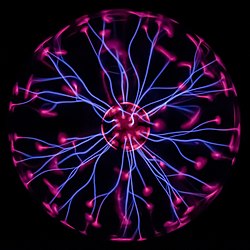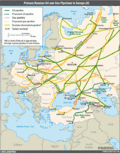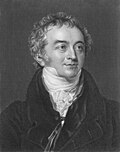Portal:Energy
| Main page | New articles & Tasks |
 The Energy Portal Welcome to Wikipedia's Energy portal, your gateway to energy. This portal is aimed at giving you access to all energy related topics in all of its forms.
|
Page contents: Selected article • Selected image • Selected biography • Did you know? • General images • Quotations • Related portals • Wikiprojects • Major topics • Categories • Help • Associated Wikimedia |
Introduction
Energy (from Ancient Greek ἐνέργεια (enérgeia) 'activity') is the quantitative property that is transferred to a body or to a physical system, recognizable in the performance of work and in the form of heat and light. Energy is a conserved quantity—the law of conservation of energy states that energy can be converted in form, but not created or destroyed. The unit of measurement for energy in the International System of Units (SI) is the joule (J).
Forms of energy include the kinetic energy of a moving object, the potential energy stored by an object (for instance due to its position in a field), the elastic energy stored in a solid object, chemical energy associated with chemical reactions, the radiant energy carried by electromagnetic radiation, the internal energy contained within a thermodynamic system, and rest energy associated with an object's rest mass. These are not mutually exclusive.
All living organisms constantly take in and release energy. The Earth's climate and ecosystems processes are driven primarily by radiant energy from the sun. The energy industry provides the energy required for human civilization to function, which it obtains from energy resources such as fossil fuels, nuclear fuel, and renewable energy.[relevant?] (Full article...)
Selected article

Petrodollar recycling is the international spending or investment of a country's revenues from petroleum exports ("petrodollars"). It generally refers to the phenomenon of major petroleum-exporting states, mainly the OPEC members plus Russia and Norway, earning more money from the export of crude oil than they could efficiently invest in their own economies. The resulting global interdependencies and financial flows, from oil producers back to oil consumers, can reach a scale of hundreds of billions of U.S. dollars per year – including a wide range of transactions in a variety of currencies, some pegged to the U.S. dollar and some not. These flows are heavily influenced by government-level decisions regarding international investment and aid, with important consequences for both global finance and petroleum politics. The phenomenon is most pronounced during periods when the price of oil is historically high.
The term petrodollar was coined in the early 1970s during the oil crisis, and the first major petrodollar surge (1974–1981) resulted in more financial complications than the second (2005–2014). (Full article...)
Selected image

Photo credit: Postdlf
Lightning is a highly visible form of energy transfer.
Did you know?

- The Power of Community: How Cuba Survived Peak Oil is a documentary film which details Cuba's efforts to recover from the 1990s economic crisis known as the Special Period?
- The Geysers (pictured), north of San Francisco, California, is the largest geothermal power development in the world?
- The International Energy Agency was founded in 1974 by the Organisation for Economic Co-operation and Development (OECD) in the wake of the 1973 oil crisis?
- Indian Railways has started to use Jatropha oil, blended with diesel fuel in various ratios, to power its Diesel locomotives?
- The South Wales Gas Pipeline is the largest high pressure gas pipeline in the United Kingdom?
- The Presbyterian Church (USA) was the first major religious denomination in the world to call on its followers to become carbon neutral?
- There was partial meltdown at the Three Mile Island nuclear power plant in 1979?
- A hybrid electric vehicle achieves better fuel economy than a conventional vehicle without being hampered by the limited range of an electric vehicle?
Selected biography
Maxwell studied natural philosophy, moral philosophy, and mental philosophy at the University of Edinburgh, before graduating in mathematics at the University of Cambridge, where he would conduct much of his career. He built on Michael Faraday's work on magnetic induction, using elements of geometry and algebra to demonstrate that electric and magnetic fields travel through space, in the form of waves, and at the constant speed of light. Finally, in 1861, Maxwell proposed that light consisted of undulations in the same medium that is the cause of electric and magnetic phenomena. In the same year he was elected to the Royal Society.
In 1864, Maxwell presented what are now known as Maxwell's equations to the Royal Society. These collectively describe the behaviour of both the electric and magnetic fields, as well as their interactions with matter.
In the news
- 27 July 2025 – Tariffs in the second Trump administration
- U.S. president Donald Trump and European Commission president Ursula von der Leyen announce a trade deal that would set a reciprocal 15% tariff on all exports and promise to boost European Union investment into the U.S. by $600 billion. The EU also promises to purchase $750 billion in American energy products over an unspecified period of time. (BBC News)
- 15 July 2025 – Indonesia–United States relations
- U.S. president Donald Trump announces a new trade deal with Indonesia, where Indonesia will purchase $15 billion in energy and $4.5 billion in agricultural products, along with 50 Boeing jets. Indonesia will also allow importation of U.S. products without tariffs, while the U.S. will maintain a 19% tariff on all goods coming from Indonesia. (Financial Times)
General images
Quotations
- "Without radical international measures to reduce carbon emissions within the next 10 to 15 years, there is compelling evidence to suggest we might lose the chance to control temperature rises. Failure to act will make an increase of between 2 and 5 degrees [3.6 - 9°F] in average temperatures almost inevitable." – Tony Blair, 2006
- "The question is not whether climate change is happening or not, but whether, in the face of this emergency, we ourselves can change fast enough." – Kofi Annan, 2006
- "I promise you a day will come when our children and grandchildren will look back and they will ask one of two questions. Either they will ask, 'What in God's name were they doing? Didn't they see the evidence?' Or, they may look back and say 'How did they find the uncommon moral courage to rise above politics and redeem the promise of American democracy?'" – Al Gore, 2007, on global warming.
Related portals
WikiProjects
WikiProjects connected with energy:
Other WikiProjects that may be of interest:
Major topics
Major categories
National energy supply, use & conservation
National electricity sector
Politics, economics, environment
- Climate change
- Energy conservation
- Energy economics
- Energy crises
- Energy development
- Energy policy
- Peak oil
Energy sources
- Fuels
- Biofuels
- Fossil fuels
- Fusion power
- Nuclear technology
- Renewable energy
- Energy conversion
- Electric power
- Energy storage
Energy-related design
Scientific usage
Help

Puzzled by energy?
Can't answer your question?
Don't understand the answer?
- Ask at the reference desk
- Read the Wikipedia help pages
For further ideas, to leave a comment, or to learn how you can help improve and update this portal, see the talk page.
Associated Wikimedia
The following Wikimedia Foundation sister projects provide more on this subject:
-
Commons
Free media repository -
Wikibooks
Free textbooks and manuals -
Wikidata
Free knowledge base -
Wikinews
Free-content news -
Wikiquote
Collection of quotations -
Wikisource
Free-content library -
Wikiversity
Free learning tools -
Wiktionary
Dictionary and thesaurus














































































































































































